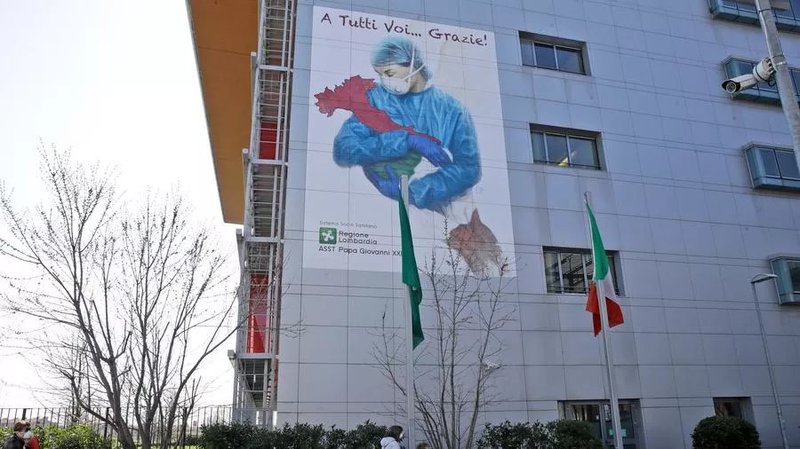om a decentred theory of governance perspective, the State is Stateless or it is everywhere in the interactions of government, power and authority which are made up of different and competing actors inspired by different beliefs and traditions. In some ways, we could say that the State is where you experience it.
Bergamo is one of the most European, richest and productive areas of Italy, and, sadly, one the epicentres of COVID-19. From Bergamo we have seen the images of motorcars driven by armed forces and full of dead bodies and heard the sound of ambulances. We have touched the fear – directly or indirectly – of a friend, a lover, a colleague, a relative with COVID-19, and experienced a crematorium running at full capacity 24 hours a day and 7 days a week.
But, from Bergamo there are also positive stories. One of us is managing the municipality of Bergamo. We discovered that managing during a pandemic is possible only with a shift from bureaucracy to generosity. Volunteers and public employees go beyond formal roles and hierarchies to help others achieve a common mission – saving lives. Organizations become more mission oriented and it is easier to collaborate internally and externally with other organizations (e.g. police, central and regional government, armed forces).
What before seemed impossible, now happens. The Bergamo municipality moved from having 30 to more than 400 smart workers and smarter work in a few days. Acquisition of supplies and services was achieved in a very short time with an extraordinary cross-sector collaboration. COVID-19 has disrupted many assumptions requiring solutions with new logics. Hotels have been converted into accommodation for the homeless; luxury fashion brands were now producing clothes for medical equipment; a new field hospital has been realized in two weeks with the help of volunteers.
Amidst the toughest crisis for our generation we saw one type of person emerge: those who are generous and step up. From homo consumens, our actions and performativity were guided by the desire to give something for others, whether this was help, money or even just moral support in a few words. By revisiting and broadening the idea of generosity, we too experienced the role that gift-giving plays in social life.
In Bergamo there is a community who is suffering, but who has decided to be reborn, as this new video and song release tells us. The municipality of Bergamo has just convened its employees and stakeholders to work on a new programme – from crisis to renaissance. Hannah Arendt reminded us that human beings are born to begin and we can transform existing conditions putting new processes in motion. After the mourning period, Bergamo people are rallying for a new beginning.
Hannah Arendt reminded us that human beings are born to begin and we can transform existing conditions putting new processes in motion.

However, far from taking a romanticising and moralistic stance, a new beginning could go in several different directions. As some people put it, try to ask to a Bergamasco about any of the technical clauses regulating the EU and then you understand populism. And Bergamo is as productive as Germany, even called by some people our ‘South Bavaria’.
Covid-19 seems to have clear ideas. Its “strategy” is to divide us and to close down the interconnections between people, businesses and institutions on which our world is based. The temptation is to divide the “efficient” northern Europe from the “less productive” southern Europe and for the former countries to believe that their fate can be separated from that of their neighbours.
Some others are using the virus to show the superiority of the surveillance state. The spectre of using the virus to further legitimize a technology-enabled “Democratura” is on our doorstep with Orban, China and Russia. As the Financial Times recently warned, the virus lays bare the frailty of the social contract. This could lead to an even more dangerous post-populism where populism moves from a rhetoric into a permanent governance structure based on one Great Person using technology and technocracy to dismantle representative democracy.
But this would be a huge mistake: the world that is taking shape sees the weight of some geopolitical areas grow – the United States, China, India, Russia. For the nation states of the Old Continent, the only way to advance is to rewrite an alliance which make sense for European civil society, not just from a technical point of view. However, the technocratic European Union doesn’t register that governance is very much about making sense through the dilemmas of belief and tradition which we experience in our daily lives and interactions, something again which is easier to grasp from a decentred governance perspective.
The technocratic European Union doesn’t register that governance is very much about making sense through the dilemmas of belief and tradition which we experience in our daily lives and interactions.
The European Union is now facing a crossroads. Either it boldly takes the path of a new social contract or it is destined to disintegrate in the grip of internal selfishness. Had European leaders seen, heard or felt what happened in Bergamo, they would understand that you can only save Europe with ethical generosity and imagination. In Bergamo and all the communities coping with this crisis, what seemed impossible is already happening now, for the common good.
We need to re-imagine a European Union which makes sense to its citizens after the trauma of COVID-19. The social and democratic project that is at stake here is at a crossroads: between a divisive and angry European society, or a new generative Europe where creativity and human flourishing can become the core elements of a new developmental model.